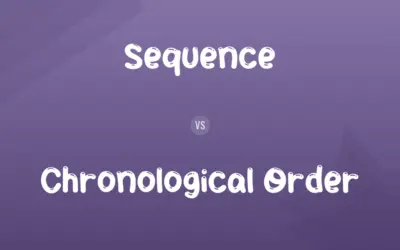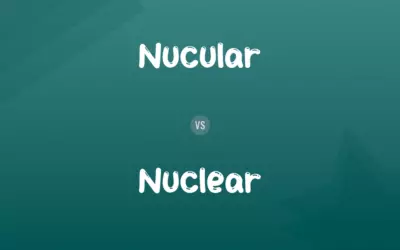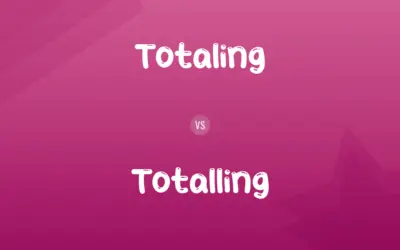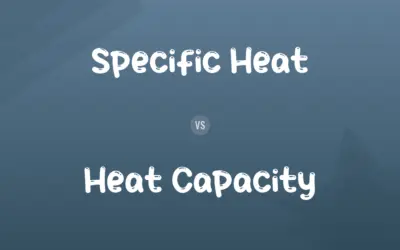Natural Gas vs. LPG: Difference and Comparison
By Muazma Batool & Muneeza Rehman — Published on April 20, 2024
Natural Gas is a fossil fuel primarily composed of methane, used for heating and electricity, while LPG (Liquefied Petroleum Gas) is a mixture of propane and butane, used in heating, cooking, and as fuel for vehicles.
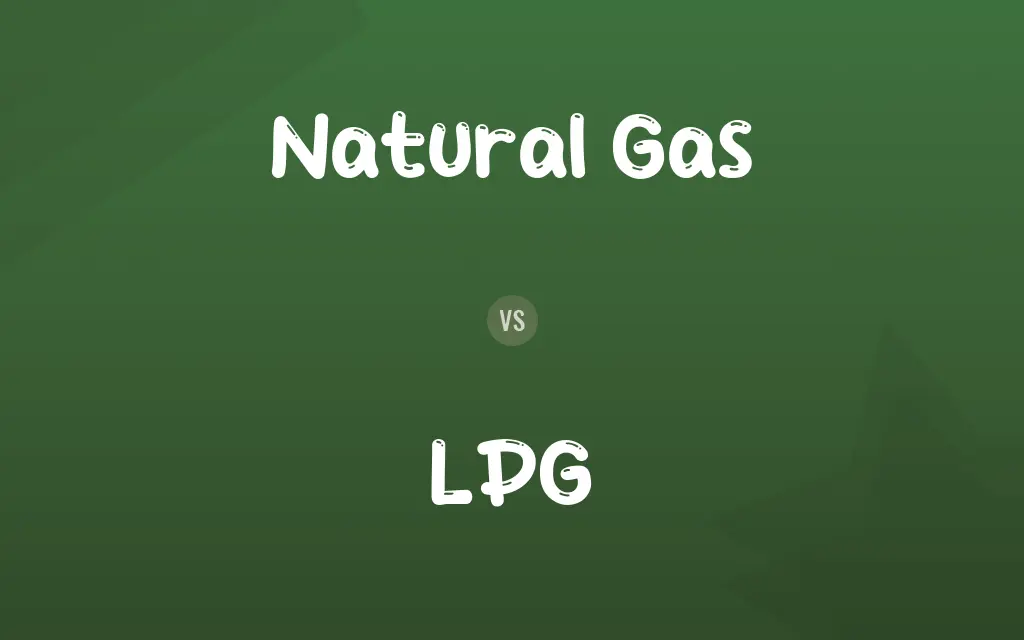
Difference Between Natural Gas and LPG
Natural gas and LPG (Liquefied Petroleum Gas) are both important sources of energy commonly used for heating, cooking, and in some cases, fueling vehicles. However, they differ significantly in composition, source, storage, and application. Natural gas is primarily methane (CH4) with small quantities of other hydrocarbons and is extracted from underground gas fields or in conjunction with oil production. It's distributed through pipelines as a gas. LPG, on the other hand, is mainly composed of propane (C3H8) and butane (C4H10), gases that are by-products of natural gas processing and petroleum refining. LPG is stored and transported in liquid form under pressure in cylinders or tanks.
Muazma Batool
Apr 20, 2024
The use of natural gas and LPG varies depending on infrastructure and availability. Natural gas, due to its need for a pipeline distribution system, is typically used where there is access to a gas network. It's favored for residential heating, electricity generation, and as an industrial energy source. LPG is more portable and doesn't require a pipeline for distribution, making it a preferred choice in areas without natural gas infrastructure, for outdoor cooking (e.g., gas barbecues), in caravans, and in rural heating applications. It's also used as an alternative fuel for vehicles.
Muazma Batool
Apr 20, 2024
From an environmental perspective, both fuels are cleaner alternatives to coal and oil in terms of emissions, producing less CO2 and fewer pollutants when burned. However, methane, the primary component of natural gas, is a potent greenhouse gas if released into the atmosphere unburned. LPG, being a mixture of propane and butane, also has environmental impacts, particularly if it leaks, as both components are greenhouse gases, though less impactful than methane.
Muazma Batool
Apr 20, 2024
In terms of energy content and efficiency, LPG has a higher calorific value per unit volume than natural gas, meaning it produces more energy when burned. This can make LPG a more efficient fuel choice for heating and cooking, although this is somewhat offset by its higher cost compared to natural gas, where natural gas infrastructure exists.
Elijah
Apr 20, 2024
Safety considerations for both gases include the risk of explosion in the event of a leak. Natural gas is lighter than air and will disperse quickly if leaked, whereas LPG is heavier than air and can accumulate in low-lying areas, posing a greater risk of explosion if not properly ventilated.
Muazma Batool
Apr 20, 2024
Understanding the differences between natural gas and LPG is crucial for making informed decisions about energy use, especially considering the availability, cost, and environmental impact of each fuel type.
Lucas
Apr 20, 2024
Natural Gas vs. LPG Comparison Chart
Composition
Primarily methane (CH4).
Mixture of propane (C3H8) and butane (C4H10).
Muazma Batool
Apr 20, 2024
Source
Extracted from underground or with oil.
By-product of natural gas processing and petroleum refining.
Muazma Batool
Apr 20, 2024
Storage/Transport
Via pipelines as a gas.
In liquid form under pressure in cylinders or tanks.
Muazma Batool
Apr 20, 2024
Usage
Heating, electricity, industrial energy.
Heating, cooking, vehicle fuel, rural applications.
Levi
Apr 20, 2024
Environmental Impact
Lower CO2 emissions than coal/oil, methane is a potent greenhouse gas.
Cleaner than coal/oil, propane and butane are less potent greenhouse gases than methane.
Henry
Apr 20, 2024
Energy Content
Lower calorific value per unit volume than LPG.
Higher calorific value per unit volume, more energy-efficient.
Henry
Apr 20, 2024
Safety
Lighter than air, disperses quickly; risk of explosion if leaked.
Heavier than air, can accumulate; higher explosion risk if not ventilated.
Kaitlyn
Apr 20, 2024
Natural Gas vs. LPG Definitions
◉Natural Gas
Widely available via pipeline, cleaner burning than coal or oil, cost-effective where infrastructure exists.
Using natural gas for electricity generation reduces CO2 emissions compared to coal plants.
Muazma Batool
Feb 22, 2024
◉LPG
A portable fuel stored as a liquid, used for heating, cooking, and as vehicle fuel, composed of propane and butane.
LPG is a popular choice for outdoor cooking due to its portability and high energy content.
Muazma Batool
Feb 22, 2024
◉Natural Gas
A fossil fuel used primarily for heating, cooking, and electricity generation, composed mostly of methane.
Natural gas heating systems provide efficient warmth for homes connected to the gas network.
Muazma Batool
Feb 22, 2024
◉LPG
Portable, does not require pipeline, higher calorific value than natural gas.
LPG heaters are ideal for places without access to natural gas pipelines.
Muazma Batool
Feb 22, 2024
◉Natural Gas
Methane leaks can significantly impact greenhouse gas emissions.
Methane emissions from natural gas pipelines are a concern for climate change.
Muazma Batool
Feb 22, 2024
◉LPG
Higher cost than natural gas, risk of accumulation and explosion if leaked.
Safety measures are crucial for storing LPG tanks to prevent leaks and explosions.
Muazma Batool
Feb 22, 2024
Natural Gas vs. LPG Frequently Asked Questions
Which is more environmentally friendly, natural gas or LPG?
Both are cleaner than coal and oil, but natural gas has a higher potential for climate impact due to methane emissions, despite having lower CO2 emissions when burned.
Muazma Batool
Apr 20, 2024
Why is LPG stored in cylinders while natural gas is not?
LPG can be liquefied under pressure, making it portable, whereas natural gas is distributed through pipelines due to its gaseous state at normal conditions.
Muazma Batool
Apr 20, 2024
Is LPG safer to use than natural gas?
Both gases require proper handling and safety measures. LPG's tendency to accumulate can pose a higher risk of explosion if not properly ventilated.
Kaitlyn
Apr 20, 2024
Can I switch from using natural gas to LPG?
Yes, but it requires different appliances or conversion kits due to the differences in pressure and calorific value.
Muazma Batool
Apr 20, 2024
How do the costs of natural gas and LPG compare?
Natural gas is generally cheaper where pipeline infrastructure exists, while LPG can be more expensive due to processing and transportation costs.
Leo
Apr 20, 2024
What are the main uses of LPG in rural areas?
In rural areas without natural gas pipelines, LPG is used for heating, cooking, and sometimes as fuel for generators or farm equipment.
Olivia
Apr 20, 2024
Why is LPG considered more energy-efficient than natural gas?
LPG has a higher calorific value, meaning it produces more energy per unit volume when burned, making it more efficient for heating and cooking.
Jonathan
Apr 20, 2024
Can both natural gas and LPG be used for cooking?
Yes, both are used for cooking, but appliances designed for one are not directly interchangeable with the other without modification.
William
Apr 20, 2024
How do I know if my appliance can use LPG?
Check the appliance's manual or label; many are specifically designed for one type of gas, though dual-fuel appliances and conversion kits are available.
Muazma Batool
Apr 20, 2024
What's the impact of methane leaks from natural gas?
Methane is a potent greenhouse gas, and its release into the atmosphere from leaks in the natural gas system can significantly contribute to climate change.
William
Apr 20, 2024
Content Creators
Written by
Muazma BatoolAs a content editor, Muazma Batool is not just a grammar guru but a creative mastermind who breathes life into every word. With an eagle eye for detail and a passion for storytelling, she transforms bland text into engaging content that captivates audiences and drives results.
Co-written by
Muneeza RehmanAt Comparisons.wiki, Muneeza skillfully navigates the vast sea of information, ensuring clarity and accuracy as the lead content editor. With a keen eye for detail, she curates every comparison to enlighten and engage readers.








